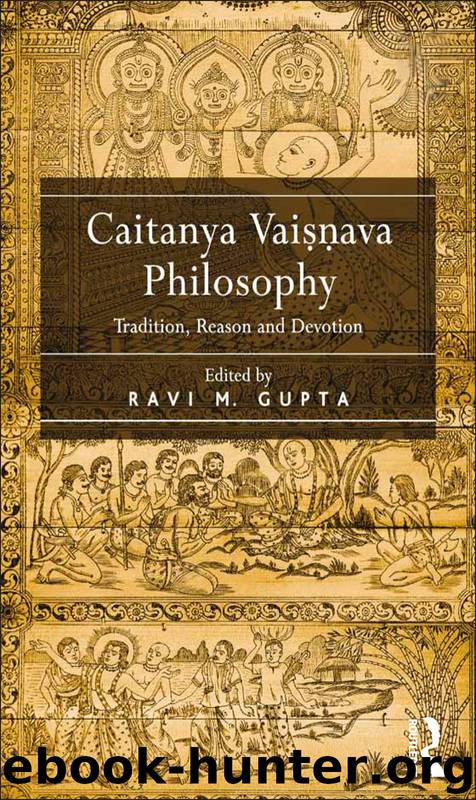Caitanya Vaisnava Philosophy by Gupta Ravi M.;

Author:Gupta, Ravi M.;
Language: eng
Format: epub
Publisher: Taylor & Francis Group
Published: 2014-04-14T16:00:00+00:00
ETHICS AND PRACTICE
Caitanya Vaiṣṇava Ethics in Relation to Devotional Community
Joseph T. O’Connell
Introduction: General Challenge of Locating Brāhmaṇic Ethics and Meta-ethical Theory
To enquire into the ethical import of any tradition of religious doctrine and practice, especially when that tradition has shaped the faith and behavior of millions of adherents and continues to do so in its region of origin and beyond for half a millennium is a reasonable thing to do. In a volume exploring the distinctive philosophy of that tradition it is quite appropriate to enquire into the more systematic and theoretical formulation of its ethics and its more philosophical or theological reflections on the moral virtues it espouses. In the case of the Vaiṣṇava tradition inspired by the charismatic Bengali Indian ascetic and revivalist, Śrī Kṛṣṇa Caitanya, more simply Caitanya (1486–1533), however, such enquiry and exploration encounter a formidable challenge. There is no readily available corpus of systematic philosophical or theological texts within what we may call the Caitanya (or Gauḍīya) Vaiṣṇava tradition1 that explicitly elaborates ethical theory as such. This is somewhat surprising because prolific and influential authorities on Caitanya Vaiṣṇava doctrine and practice, especially the Gosvāmīs based in Vrindavan, produced an impressive corpus of minutely detailed, systematically structured and in some areas theoretically sophisticated systems of philosophic-cum-theological analyses and reflections such as devotional reconstructions of Sanskrit literary aesthetic theory (bhakti-rasa śāstra), psychologically astute systems of spiritual discipline (sādhanā) and hermeneutics of sacred scriptural texts (especially exegesis of the Bhāgavata Purāṇa). The paucity of philosophical or theological treatment of ethics by them is surprising in another respect because intensive interaction among Vaiṣṇava devotees and potential devotees is a fundamental constituent of their devotion to God as Kṛṣṇa and such interaction inevitably raises ethically pertinent issues and implies certain moral qualities of a devotee.
On the other hand, this virtual absence of systematic ethical analysis and reflection ought not be so surprising in its historical context. For whatever reasons, this seems not to be a Caitanya Vaiṣṇava aberration. Classical Brāhmaṇic traditions of philosophic-cum-religious thought such as the so-called six orthodox Brāhmaṇic viewpoints (darśanas)—Sāṁkhya, Yoga, Nyāya, Vaiśeṣika, Pūrvamīmāṁsa, Uttaramīmāṁsa (Vedānta)—have produced sophisticated treatments of ontology, cosmology, epistemology, logic, language, psychology, textual hermeneutics, and soteriology. Yet even they failed to treat ethics or meta-ethics2 as a distinct focus for comparably sophisticated investigation, or so contend many influential modern scholars of Indian philosophy.3 A similar disinclination to develop ethical and meta-ethical theory is evident in Brāhmaṇic dharma-śāstra, which prescribes a vast array of obligatory ritual and social svadharmas differentiated by caste, state in life, gender, and occupation. There are also brief declarations of a set of moral virtues (quite similar to Vaiṣṇava ones) constitutive of sāmānya-dharma or sādhārana-dharma, applicable to a person of “twice-born” castes or all castes. If nothing else, the striking contrast between the (relative) universality, equality and personal qualities of the sāmānya-dharma or sādhārana-dharma and the diversity, inequality, and impersonal character of the svadharmas could provide an opening for reflection on morality and elaboration of ethical and meta-ethical theory; but the opening seems not to have been exploited.
Download
This site does not store any files on its server. We only index and link to content provided by other sites. Please contact the content providers to delete copyright contents if any and email us, we'll remove relevant links or contents immediately.
The remains of the day by Kazuo Ishiguro(7540)
Tools of Titans by Timothy Ferriss(6934)
The Black Swan by Nassim Nicholas Taleb(6182)
Inner Engineering: A Yogi's Guide to Joy by Sadhguru(5886)
Giovanni's Room by James Baldwin(5870)
The Way of Zen by Alan W. Watts(5787)
The Six Wives Of Henry VIII (WOMEN IN HISTORY) by Fraser Antonia(4784)
The Power of Now: A Guide to Spiritual Enlightenment by Eckhart Tolle(4747)
Astrophysics for People in a Hurry by Neil DeGrasse Tyson(4613)
Asking the Right Questions: A Guide to Critical Thinking by M. Neil Browne & Stuart M. Keeley(4564)
12 Rules for Life by Jordan B. Peterson(3722)
The Ethical Slut by Janet W. Hardy(3494)
Skin in the Game by Nassim Nicholas Taleb(3455)
Housekeeping by Marilynne Robinson(3395)
The Art of Happiness by The Dalai Lama(3376)
Double Down (Diary of a Wimpy Kid Book 11) by Jeff Kinney(3267)
Skin in the Game: Hidden Asymmetries in Daily Life by Nassim Nicholas Taleb(3259)
Walking by Henry David Thoreau(3227)
12 Rules for Life: An Antidote to Chaos by Jordan B. Peterson(3195)
